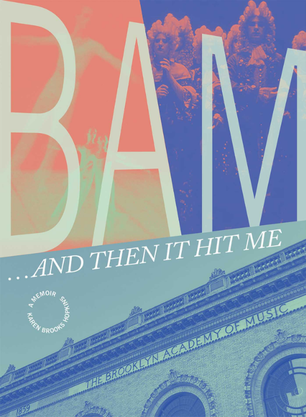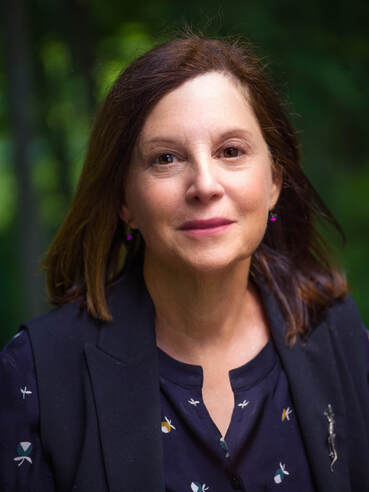Karen Brooks Hopkins Shares Some Insight into her 36-Year Tenure
with the Brooklyn Academy of Music
|
BAM…and Then It Hit Me, written by Karen Brooks Hopkins, president emerita of the Brooklyn Academy of Music (BAM), is an inspiring memoir of her 36 years at the iconic cultural institution, America's oldest performing arts center. This book delves into her journey as the institution’s leader and the challenges she faced and overcame.
Readers can find an exclusive excerpt in Sanctuary. "Karen created at BAM a feeling of 'family,' of belonging to a community of artists. Belonging is important because, like many other artists, I am also prone to discouragement and insecurity. Karen’s support was the perfect antidote to that awful inner voice that I hear in my head: 'Isabella, enough with wanting to be an artist, go get a real job.' When I started to write for theater, I called Karen. Without hesitation, she said, 'Let’s see what we can do for you,' and she opened a new chapter in my life." ~ Isabella Rossellini, Actor and Author |
Click book cover for excerpt.
|
We asked Karen a few questions about life as a nonprofit leader.
What piece of advice would you give a nonprofit leader who is overwhelmed with fundraising events during an economic downturn?
Fundraising is never easy, and it is especially difficult in times of recession, uncertainty and economic hardship. All in all, this a complex and difficult business that is not for the faint at heart or those who can’t handle rejection. It sometimes is easy to feel hopeless and overwhelmed.
The solution I propose isn’t rocket science. Simply put your head down and muscle through it. I recommend breaking tasks into manageable parts and setting daily goals for completing them. Remember the old saying, “How do you eat an elephant? One bite at a time!” Also, keep your board members and key supporters close. They are your greatest champions and are the most reliable when things are tough. Regular communication with them (though it needs to be informative and thoughtful, not just a desperate cry for help) is essential.
Finally, while scrupulous oversight of spending is critical during a recession, sometimes it is the perfect moment to launch a big important project. Donors will often rise through adversity to support a visionary idea. It’s uplifting to do so rather than carry on with business as usual.
What is the moment you are most proud of considering your many years with BAM.
When you have a 36-year career based at one institution, there are many proud moments.
There is, however, one achievement that stands taller than the rest. In 2013, BAM received the National Medal of Arts from President Obama. We were welcomed to an amazing ceremony at the White House where the President and First Lady presented me with the medal. It was a wonderful experience to have our work recognized at the highest level by the President. And (bonus point!) as I shook the President’s hand, he whispered to me that he had actually been to a performance at BAM in 1983. I couldn’t have been more pleased and honored.
Looking back, what is one challenge you overcame that you learned the most from?
From a fundraising perspective, my biggest challenge was to build a healthy endowment for BAM while simultaneously delivering enough money to maintain a robust annual program and staff. An endowment is the holy grail of institution building because, if invested properly, it will grow and provide through the annual disbursement, a regular source of much needed income. It’s also a challenge not to invade the principal when the annual campaign isn’t going well.
Beyond fundraising, a leader of a large institution has on-going challenges in terms of managing staff and salary expectations, recruiting board members, and keeping facilities up to date. Let’s face it, being the boss can be exhilarating, but there is a lot to keep you up at night.
What piece of advice would you give a nonprofit leader who is overwhelmed with fundraising events during an economic downturn?
Fundraising is never easy, and it is especially difficult in times of recession, uncertainty and economic hardship. All in all, this a complex and difficult business that is not for the faint at heart or those who can’t handle rejection. It sometimes is easy to feel hopeless and overwhelmed.
The solution I propose isn’t rocket science. Simply put your head down and muscle through it. I recommend breaking tasks into manageable parts and setting daily goals for completing them. Remember the old saying, “How do you eat an elephant? One bite at a time!” Also, keep your board members and key supporters close. They are your greatest champions and are the most reliable when things are tough. Regular communication with them (though it needs to be informative and thoughtful, not just a desperate cry for help) is essential.
Finally, while scrupulous oversight of spending is critical during a recession, sometimes it is the perfect moment to launch a big important project. Donors will often rise through adversity to support a visionary idea. It’s uplifting to do so rather than carry on with business as usual.
What is the moment you are most proud of considering your many years with BAM.
When you have a 36-year career based at one institution, there are many proud moments.
There is, however, one achievement that stands taller than the rest. In 2013, BAM received the National Medal of Arts from President Obama. We were welcomed to an amazing ceremony at the White House where the President and First Lady presented me with the medal. It was a wonderful experience to have our work recognized at the highest level by the President. And (bonus point!) as I shook the President’s hand, he whispered to me that he had actually been to a performance at BAM in 1983. I couldn’t have been more pleased and honored.
Looking back, what is one challenge you overcame that you learned the most from?
From a fundraising perspective, my biggest challenge was to build a healthy endowment for BAM while simultaneously delivering enough money to maintain a robust annual program and staff. An endowment is the holy grail of institution building because, if invested properly, it will grow and provide through the annual disbursement, a regular source of much needed income. It’s also a challenge not to invade the principal when the annual campaign isn’t going well.
Beyond fundraising, a leader of a large institution has on-going challenges in terms of managing staff and salary expectations, recruiting board members, and keeping facilities up to date. Let’s face it, being the boss can be exhilarating, but there is a lot to keep you up at night.
|
Karen Brooks Hopkins was an employee of the Brooklyn Academy of Music (“BAM”) for 36 years, serving as its president from 1999 until retiring in 2015.
Karen is senior advisor and a board member of the Onassis Foundation, the Nasher Haemisegger Fellow at SMU DataArts located at Southern Methodist University from 2016-2021, and a board member of the Trust for Governors Island and the Jerome L. Greene Foundation. From 2015-2017, Karen served as Senior Fellow at the Andrew W. Mellon Foundation. Karen has been awarded honorary degrees from St. Francis College, Long Island University, Pratt Institute and Columbia University. She has also received international honors, including the King Olav’s Medal from Norway, the Chevalier de L’Ordre des Arts et des Lettres from France, and the Commander of the Royal Order of the Polar Star from Sweden. While at BAM, the institution received the National Medal of Arts from President Obama. |
Photo Credit: Bob Klein
|
UPCOMING AUTHOR EVENTS/SIGNINGS:
September 19, 2022 International Economic Development Conference Downtown Oklahoma City, OK September 29, 2022 Saratoga Performing Arts Center Saratoga, NY October 17 - 19, 2022 Keynote Speaker Annual Convention of the Cultural Forum & the City’s Program for Arts Administrators Tel Aviv, Israel |




